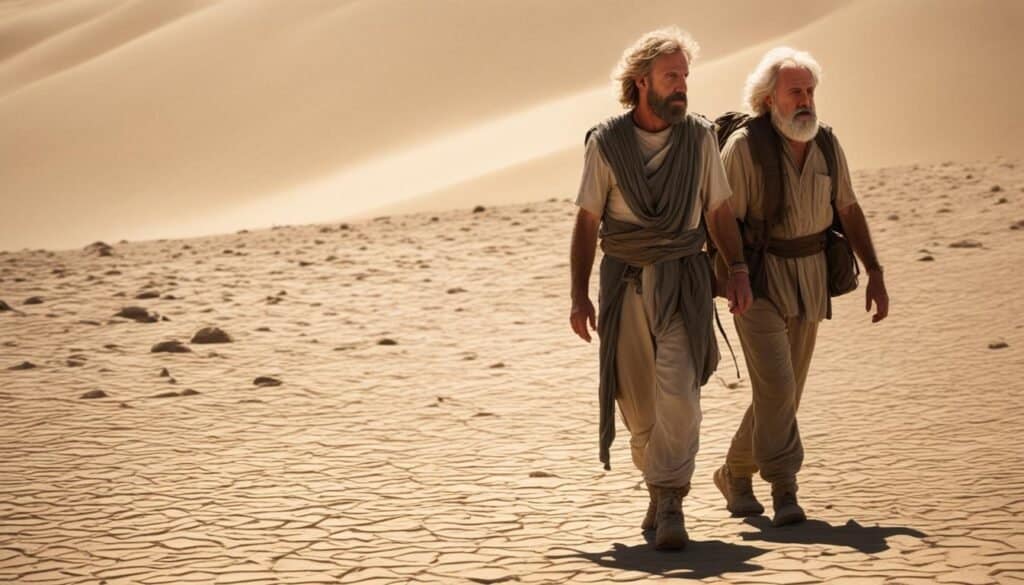Family dysfunction is a fascinating and puzzling topic that has troubled us since forever. The ancient texts of Genesis are filled with stories of family discord. In our journey through the Bible’s pages, we’ll explore 10 powerful cases of family dysfunction. We will discover the profound lessons they offer.
These stories range from the blame game of Adam and Eve to Jacob’s complex marriages. They shed light on the ups and downs of family ties. Each tale makes us question, wonder, and think about our family lives.
Together, let’s dive into these ancient yet relatable family dramas. We’ll uncover the wisdom hidden in their struggles. How have these narratives influenced our views on family dysfunction? And what wisdom can we draw from the challenges faced by those who came before us?
Key Takeaways:
- Genesis is a treasure trove of stories that depict family dysfunction.
- The tales in Genesis provide timeless lessons about human relationships.
- Examining ancient conflicts can challenge our beliefs and preconceptions.
- Understanding the consequences of family dysfunction can help us navigate our own relationships.
- By exploring these stories, we can gain valuable insights into the complexities of family dynamics.
Adam and Eve’s Blame Game: The First Instance of Conflict in the Human Family
Adam and Eve’s story in Genesis shows us one of the earliest family conflicts. This happened after they ate from the forbidden tree. This moment reveals how shifting blame harms families, highlighting the importance of taking responsibility.
When asked by God, Adam blames Eve for giving him the fruit. Eve, in turn, blames the serpent. Their actions show how avoiding personal responsibility started in the earliest human family.
“The woman you put here with me—she gave me some fruit from the tree, and I ate it,” Adam said. “The serpent deceived me, and I ate,” replied Eve.
Adam and Eve’s blame game teaches us about blaming and its consequences. Their failure to own up to their actions strained their relationship. It also negatively affected all human families.
The story is a lesson about truthfulness, taking responsibility, and open talks in families. Addressing conflicts and being responsible helps make our relationships stronger.
Key Takeaways:
- The Adam and Eve narrative highlights the first instance of conflict and blame-shifting in the human family.
- Adam and Eve both evade responsibility by blaming each other and the serpent.
- The story emphasizes the consequences of shirking accountability and shifting blame.
- It serves as a reminder of the importance of taking responsibility and open communication within our own families.
Cain and Abel’s Rivalry: Jealousy and Violence Among Siblings
In the book of Genesis, we learn about Cain and Abel. Their story is found in Genesis 4. It’s a powerful tale about jealousy and the violence it can cause. When God favors Abel’s sacrifice over Cain’s, Cain becomes jealous. His jealousy leads to him killing his brother.
This tale shows us how envy can ruin family bonds. It reminds us that finding peaceful solutions to conflicts is very important, especially among siblings. The tragic outcome of Cain and Abel’s story warns us not to let envy turn into something worse, like violence.
The Destructive Power of Jealousy
Jealousy was at the heart of Cain and Abel’s story. It caused Cain’s jealousy and led to the story’s sad ending. Jealousy happens when we want what someone else has, and it can turn into resentment and even violence. *
Jealousy is a deceptive, insidious force that can poison even the closest of relationships. It blinds us to reason and compels us to act out of character, causing irreparable damage.
It’s easy for siblings to get jealous and compare themselves. They often live in the same environment and share similar experiences. But the tale of Cain and Abel shows how harmful unchecked jealousy can be.
The Importance of Resolving Conflicts Peacefully
Cain and Abel’s story teaches us the importance of making peace. They show us it’s better to solve problems without jealousy or violence. This is a key lesson we can learn from them. *
Resolving conflicts peacefully not only preserves and strengthens relationships but also fosters personal growth and development. It allows us to find common ground and promotes empathy and compassion.
The lesson from Cain and Abel is clear: choose peace over violence. Their story warns us that fights can lead to a lot of damage. This damage affects not just those involved but the family as a whole.
Learning from Cain and Abel’s Tragic Legacy
Cain and Abel’s story makes us think about our own relationships. Do we get envious of our siblings or others we care about? Are we ready to talk and find peace when there’s a fight? *
By reflecting on Cain and Abel’s lessons, we can aim for better, jealousy-free relationships with our siblings. This choice helps build a family united in love and understanding.
As we live our lives, let’s remember Cain and Abel’s tragedy. Their story warns us about the risks of envy and violence. It encourages us to follow a path of reconciliation and peace instead.

Noah’s Family Discord: The Curse of Canaan and Its Lasting Impact
After the flood, a new start began for Noah and his family. Yet, family discord soon emerged. It made a significant impact for many years. This discord came from an event where Noah was found drunk. The incident led to the curse of Canaan. This happened in Genesis 9:20-27.
Ham saw his father in a drunken state and telling his brothers was his action. He should have acted with care. Instead, he chose to disrespect his father by mocking him with his brothers, Shem and Japheth.
“And Noah awoke from his wine and knew what his youngest son had done to him. He said, ‘Cursed be Canaan; a servant of servants shall he be to his brothers.'” – Genesis 9:24-25
Upon discovering the disrespect, Noah cursed Ham’s son, Canaan. This curse deeply affected Canaan and his descendants. It changed history in significant ways.
The Lasting Impact:
- Geopolitical Implications: The curse impacted future generations. It led to conflicts and rivalries. These struggles over land and power can be linked back to this ancient curse.
- Legacy of Servitude: Canaan and his children were marked as perpetual servants. They faced the rule of other nations. This burden stayed with the Canaanites throughout history.
- Religious Significance: The curse is key in biblical stories. It leads to the Israelites’ conquest of the Promised Land. It reminds us of the harm caused by family discord and the importance of family unity.
This story of Noah’s family discord and the curse of Canaan teaches us a lot. It reminds us to always show respect and dignity within our families. Understanding this ancient story helps us see the deep effects our actions can have on our families.
Abraham, Sarah, and Hagar: Rivalry, Conflict, and Exile
The book of Genesis shows the detailed relationships in Abraham and Sarah’s family. They faced issues, including Sarah’s struggle to have children. She offered her servant, Hagar, to Abraham, starting a difficult series of events. This resulted in tension, fighting, and Hagar and Ishmael being forced to leave.
“I[V] adon’t seem to be able to have children. Take my maid; perhaps I can have a family through her,” Sarah tells Abraham.
Abraham has a child, Ishmael, with Hagar because of this. But, Sarah becomes very jealous and upset. The relationship between Sarah and Hagar becomes really bad.
Later, Sarah has a son named Isaac. The jealousy in the family grows even more. Sarah insists that Hagar and Ishmael should leave. She’s worried about Isaac’s future.
Abraham sadly agrees to send them away. He leads them to live in the wild. Hagar and Ishmael’s exile shows us the painful outcome of family issues.
This story about Abraham, Sarah, and Hagar is a lesson. It shows us how fragile our emotions can be. It highlights the need to handle conflicts well in families. This can stop relationships from breaking.
The Consequences of Rivalry and Conflict:
- Rivalry can create deep divides in families, causing anger and isolation.
- Family conflicts, if not addressed, can lead to hurt and have long-term effects.
- Rivalry and conflict can lead to both physical and emotional exile.
Reflecting on Abraham, Sarah, and Hagar can make us think about our own families. Being open, understanding, and ready to forgive can help. It can make our families stronger and united.

Isaac’s Favoritism and Its Consequences: Deceit and Discord Among Brothers
In Genesis 25, we read about Isaac showing favoritism to Esau, and Rebekah favoring Jacob. This led to deception and discord within the family. Isaac preferred Esau, while Rebekah liked Jacob more. This favoritism caused fights and deceit among the brothers.
Isaac was old and wanted to bless his elder son, Esau, before he died. But Rebekah knew from God that Jacob should get the blessing. So, she helped Jacob trick Isaac. Jacob pretended to be Esau by wearing his clothes.
This deceitful act had serious consequences. It caused fights and hurt within the family. Esau was very angry when he found out, and Jacob had to run away. Jacob’s trick hurt his family greatly.
Favoritism and trickery tore Isaac’s family apart. It hurt the brothers’ bond, leading them to become enemies. Jacob’s deceit made the situation worse. The family learned a hard lesson about fairness and honesty.
The story of Isaac’s favoritism teaches us valuable lessons. It shows why we should treat all family members equally. Avoiding favoritism and being honest is crucial for a healthy family. This story reminds us how important it is to have fairness, honesty, and trust among our loved ones.
Jacob’s Dysfunctional Marriages: Rivalry and Competition Between Sisters
Genesis 29-30 shares a story about Jacob, Rachel, and Leah’s complicated relationships. Jacob falls in love with Rachel at first sight and works for her father. He plans to marry her after seven years of work. Yet, on their wedding night, Jacob is tricked into marrying Leah instead. This error starts a rivalry between the sisters.
Rachel, unable to bear children, feels intense jealousy and competes against Leah. She lets Jacob marry her maid Bilhah to have children. Not to be outdone, Leah does the same with her maid, Zilpah.
The sisters fight to win Jacob’s love, creating a toxic family environment. Their story shows how jealousy and competition can ruin relationships. This scenario highlights the harm caused by unhealthy relationship dynamics.
“And when the Lord saw that Leah was unloved, He opened her womb, but Rachel was barren.” – Genesis 29:31
Despite the destructive rivalries, the ordeal teaches lessons in love and redemption. Jacob’s love for Rachel increases, making her the mother of important biblical figures. This transformation shows the power of love and forgiveness.
The story emphasizes the need for healthy family interactions. It shows the risks of jealousy, competition, and setting unrealistic expectations. By avoiding these pitfalls, we can maintain peaceful and loving family relationships.

Lessons from Jacob’s Dysfunctional Marriages:
- Jealousy and competition can poison relationships and create a toxic environment.
- Favoritism can lead to resentment and deep-seated conflicts among family members.
- Healthy communication and understanding are essential for resolving conflicts and building harmonious relationships.
- Love, forgiveness, and redemption have the power to transform broken relationships and bring healing.
Jacob’s Sons’ Jealousy of Joseph: Favoritism and Betrayal
In the book of Genesis, a story of family turmoil unfolds. It involves Jacob and his sons, focusing on Joseph. Joseph is Jacob’s favorite, which causes deep jealousy among his brothers. This jealousy eventually leads to tragic events.
The tale starts in Genesis 37 when Jacob gives Joseph a special coat. This gift shows Joseph is the favorite. It makes his brothers very jealous. Joseph, not knowing their feelings, tells them about his dreams where he is important. This makes them even angrier.

The brothers become extremely jealous when Jacob sends Joseph to them in the field. When they see Joseph coming, they plan to harm him. They take his coat and throw him into a pit. They then decide to sell him as a slave, hurting their father deeply.
This betrayal changes their family forever. Joseph goes to Egypt as a slave, but his life takes a turn. He becomes an important leader. Meanwhile, Jacob grieves for Joseph, unaware of what really happened.
This story warns against showing clear favoritism in families. Because of Jacob’s favoritism, his sons become jealous and betray Joseph. This leads to great pain and breaks the family apart. It teaches us to show equal love and respect to everyone in our families.
We should remember the jealousy Joseph faced and learn from it. We must watch how we treat our family members, avoiding actions that can cause pain. Let’s work for fairness and unity in our families, creating bonds based on love and understanding.
Dinah and the Shechemites: Deception and Bloodshed
In Genesis 34, a disturbing event unfolds involving Dinah and the Shechemites. Shechem, a prince, assaults Dinah, leading her brothers, Simeon and Levi, to seek retribution. Their actions result in a cycle of violence and revenge, causing chaos within the family.
After the assault, Simeon and Levi use deceit and violence to retaliate. They trick the Shechemites into thinking they’re open to peace. Then, they surprise them with a violent attack.
“That day all of Simeon and Levi’s brothers with their swords took vengeance in their own hands, raided the city where Shechem and his father lived, and killed all the males. They also took Dinah from Shechem’s house and left.” – Genesis 34:25-26
Their revenge leaves behind fear and anger, worsening the family’s strife. It shows the awful outcomes of choosing violence and deceit to address wrongs.
This story warns us not to echo such actions. It encourages seeking justice and peace instead of revenge. It highlights the harm caused by violence and lies, urging us to avoid them to protect our bonds.
As we consider Dinah’s tale, let’s work towards understanding, forgiveness, and healing in our own lives. May this narrative inspire us to choose a path of nonviolence and unity.
The account of Dinah and the Shechemites shows the grave results of revenge and deceit. It encourages us to aim for a society built on justice, forgiveness, and harmony.
Judah and Tamar: Betrayal and Redemption
The story of Judah and Tamar in Genesis 38 tells a heart-wrenching tale. It’s about betrayal and later finding redemption within a family’s struggles. Judah, one of Jacob’s sons, doesn’t do what he should for Tamar, his widowed daughter-in-law. This leaves Tamar in a tough spot, needing security and fairness.
Tamar takes a bold step to secure her future. She dresses up and gets Judah to be with her. This might seem tricky, but she’s fighting for what’s rightfully hers. Tamar’s actions show her courage and how far she would go, despite deceit, to face betrayal and right wrongs.
The tale of Judah and Tamar dives deep into the pains of family deceit. Yet, it shows a path to healing and redemption through honesty and change. When Judah sees his mistakes and honors Tamar’s actions, his heart truly changes.
This story’s key lesson is about the power of truth and change in fixing family wounds. It highlights how crucial it is to own up to our wrongs, ask for forgiveness, and give others another chance. The story of Judah and Tamar leaves us knowing that, even after the worst betrayals, there is a way back.
| Tale of Betrayal | Lesson of Redemption |
|---|---|
| Judah’s failure to provide for Tamar | The power of truth and repentance |
| Tamar’s deceitful actions | The lengths one might go to seek justice |
| Judah’s transformation and acknowledgment of Tamar’s righteousness | Healing fractured family bonds |
Reuben’s Transgression: The Consequences of Betrayal
In the stories of family issues in Genesis, a particular betrayal catches the eye. Reuben, Jacob’s first son, betrays his father. How? By sleeping with his father’s concubine, Bilhah. This happens in Genesis 35:22.
Reuben’s betrayal has significant results. He loses his right as the firstborn. This teaches us about the big effect betrayal can have. It reminds us of the importance of respecting family boundaries and staying loyal.
Reuben’s mistake highlights how fragile family dynamics can be. It shows the importance of respect and trust in families. Betrayal can break relationships and leave deep scars for years. This tale warns us to value honesty and keep family bonds strong.
Affiliate Disclosure: "As an Amazon Associate I earn from qualifying purchases made from links in this post. We are a participant in the Amazon Services LLC Associates Program, an affiliate advertising program designed to provide a means for us to earn fees by linking to Amazon.com."

